Interview: Skydance Heads David Ellison And Dana Goldberg Talk Future Of Terminator, Star Trek, Mission Impossible, Top Gun 2 And More
You probably don't know Skydance Productions yet, but you probably should. The company is making a major play to become the next Legendary Pictures or Marvel Entertainment, and they already are making the next installments of a number of major franchises on both the big and small screens. Their portfoilo of brands include Terminator, Star Trek, Mission Impossible, World War Z, Jack Reacher, Top Gun, GI Joe and much more.
When I was in Berlin Germany this past week to cover the Terminator Genisys premiere, I had the amazing opportunity to sit down with Skydance Productions CEO David Ellison and Chief Creative Officer Dana Goldberg to talk about their company and what they are planning for the future. This extensive roundtable interview was conducted over the course of an hour alongside three of my colleagues. Over the course of the interview we talked about a number of topics, including:
All this and more, after the jump.
Skydance Interview From The Terminator Genisys World Premiere Junket
Before we get to the interview, lets first give you some background on the interview subjects:
Okay, here is the full interview transcript:
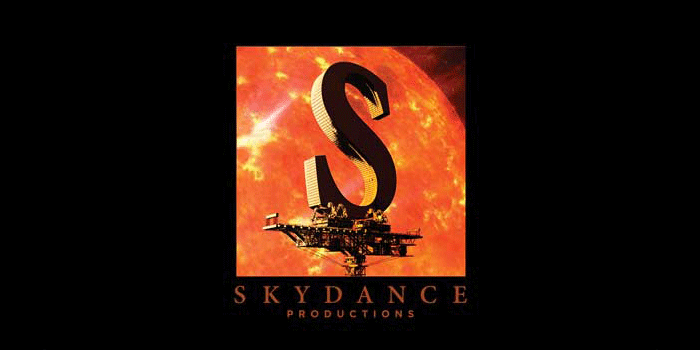 QUESTION: Let's start at the beginning: how did Skydance come about?DAVID ELLISON: Really you'd have to go all the way back to 2010. It's very fortunate we're making this movie. I'll never forget seeing Terminator 2: Judgment Day with my mom when I was eight years old, and way too young to be going to see an R-rated movie, and it changed my life. It's what made me want to make movies, and James Cameron is one of my favorite filmmakers of all time. To give you an idea of how big of a fan my family was, my mother actually got into the shape that Linda Hamilton was in in that movie, and I have pictures that can prove it. She could pretty much demolish me for way too late in my life, which is embarrassing. Really, it was films like Jurassic Park and The Empire Strikes Back and Close Encounters of the Third Kind, the original Matrix that are the movies that I loved and it became very clear early on from trying to break into the business that the only way we'd be able to make the types of movies we wanted to—which are action/adventure/science fiction/fantasy films—was to have a company that could support that. Then I was fortunate enough to meet Dana and the company would not be what it is without all the amazing work that she's brought to it.
QUESTION: Let's start at the beginning: how did Skydance come about?DAVID ELLISON: Really you'd have to go all the way back to 2010. It's very fortunate we're making this movie. I'll never forget seeing Terminator 2: Judgment Day with my mom when I was eight years old, and way too young to be going to see an R-rated movie, and it changed my life. It's what made me want to make movies, and James Cameron is one of my favorite filmmakers of all time. To give you an idea of how big of a fan my family was, my mother actually got into the shape that Linda Hamilton was in in that movie, and I have pictures that can prove it. She could pretty much demolish me for way too late in my life, which is embarrassing. Really, it was films like Jurassic Park and The Empire Strikes Back and Close Encounters of the Third Kind, the original Matrix that are the movies that I loved and it became very clear early on from trying to break into the business that the only way we'd be able to make the types of movies we wanted to—which are action/adventure/science fiction/fantasy films—was to have a company that could support that. Then I was fortunate enough to meet Dana and the company would not be what it is without all the amazing work that she's brought to it.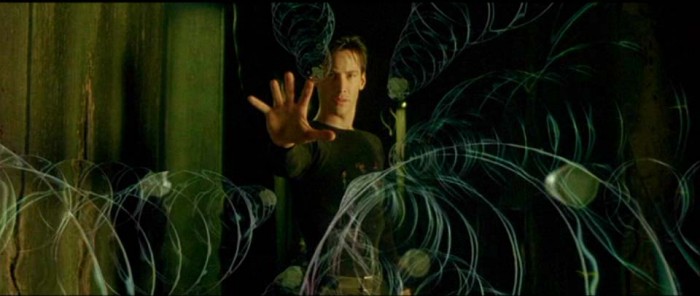 And you worked on the Matrix films.DANA GOLDBERG: I did.Do you like sci-fi?GOLDBERG: I love sci-fi. One of my all-time favorite films—and I would say the original but I don't even acknowledge that there was another one—is The Day The Earth Stood Still. I love science fiction because science fiction can take you to a whole other world but is also typically a comment on the world that you're actually living in. To be able to make those kinds of movies and to be able to make big, fun movies that have real characters and that are smart and have heart, but that a worldwide audience can go to and escape and have a good time with, I mean that's fun. You get up every day to enjoy doing that.
And you worked on the Matrix films.DANA GOLDBERG: I did.Do you like sci-fi?GOLDBERG: I love sci-fi. One of my all-time favorite films—and I would say the original but I don't even acknowledge that there was another one—is The Day The Earth Stood Still. I love science fiction because science fiction can take you to a whole other world but is also typically a comment on the world that you're actually living in. To be able to make those kinds of movies and to be able to make big, fun movies that have real characters and that are smart and have heart, but that a worldwide audience can go to and escape and have a good time with, I mean that's fun. You get up every day to enjoy doing that.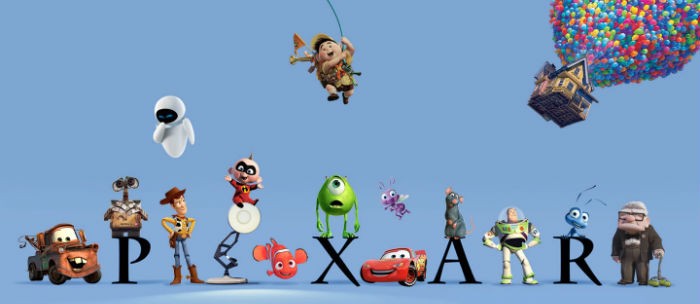 One of the things that I think Skydance has a position of strength in is that there's an inner circle that is not large. One of the things with Marvel is they have a very small inner circle and can facilitate their vision to the screen without much manipulation from outside notes and voices. Can you talk about that inner circle and who's on it and how that may be a position of strength?ELLISON: Yeah, absolutely, and really that philosophy was really derived from Pixar. One of my many mentors was Steve Jobs and I literally got to see Pixar built from the ground up when I was a kid. And that creative process they have over there is exactly what you said. Those rooms are unbelievable. They have a group of tremendous filmmakers that are all incredibly honest with one another about exactly what they think, which allows them to really elevate the work. It was that case of 1+1=100 in their case. And for us we have a really tight-knit group of people in the company. On Terminator [Genisys], it was really Dana, myself, Laeta Kalogridis, and Patrick Lussier, and then obviously Alan [Taylor] as he came into it. That was really a phenomenal group. Chris McQuarrie is somebody who we've worked with multiple times over and over and over again, and we cannot wait for people to see the next Mission: Impossible [Rogue Nation]. It is a phenomenal, phenomenal movie. We've had an amazing relationship with J.J. Abrams, we're making our 3rd and 4th movie together, and the 50th anniversary of Star Trek and Gene Roddenberry's franchise is something that we feel the tremendous pressure of living up to that legacy, and very much hope that the movie does that for audiences when they get to see it next year.GOLDBERG: Something we talked about, I think maybe in our second meeting, when we sat down to talk about David's vision for the company and what I was looking for in a company was that one of the true markers of success is actually working with the same people over and over again because it means it worked. Obviously, there's financial success, which the audience tells you loud and clear whether or not they liked your movies and your TV shows, but you know that when you're working with that same group of people over and over again, it's because the experience was a good one, and typically it means not only that the movies work but you enjoy the process. You have a creative process that works with one another, and what's really nice is you develop a shorthand. You have all of the people that David just named and there are also other writers that fit in that category, but it's a lot of fun because those are the people you can fight like hell with over creative and no one takes it personally.Now you two have made quite a few films together so I assume that you have quite a good system in place and how to play to each other's strengths. Can you tell us how that works in something like Terminator?ELLISON: Absolutely. One is we're really blunt with each other [laughs]. If Dana thinks something is a bad idea, she's not shy to share that information and neither am I, and nor is anybody that we work with. And on Terminator, the process began with Laeta and Patrick. When our offices were still at Paramount, we had a room that was dedicated solely to Terminator. And we sat in the room for about eight to ten hours a day and threw the movie up on white boards for a month, and would put the film up there, every single scene, and we'd rip it down and start over and we'd say 'this isn't working, let's try this.' And then we'd do pages and issues would come up through that and it was really that incredibly collaborative process with the four of us spending every waking moment together that is really what gave birth to what we always call 'The July Draft', which was we finally had a screenplay that we said 'this is it, this is the movie we really wanna make.' The film is, with some very small differences, very much what that draft was.
One of the things that I think Skydance has a position of strength in is that there's an inner circle that is not large. One of the things with Marvel is they have a very small inner circle and can facilitate their vision to the screen without much manipulation from outside notes and voices. Can you talk about that inner circle and who's on it and how that may be a position of strength?ELLISON: Yeah, absolutely, and really that philosophy was really derived from Pixar. One of my many mentors was Steve Jobs and I literally got to see Pixar built from the ground up when I was a kid. And that creative process they have over there is exactly what you said. Those rooms are unbelievable. They have a group of tremendous filmmakers that are all incredibly honest with one another about exactly what they think, which allows them to really elevate the work. It was that case of 1+1=100 in their case. And for us we have a really tight-knit group of people in the company. On Terminator [Genisys], it was really Dana, myself, Laeta Kalogridis, and Patrick Lussier, and then obviously Alan [Taylor] as he came into it. That was really a phenomenal group. Chris McQuarrie is somebody who we've worked with multiple times over and over and over again, and we cannot wait for people to see the next Mission: Impossible [Rogue Nation]. It is a phenomenal, phenomenal movie. We've had an amazing relationship with J.J. Abrams, we're making our 3rd and 4th movie together, and the 50th anniversary of Star Trek and Gene Roddenberry's franchise is something that we feel the tremendous pressure of living up to that legacy, and very much hope that the movie does that for audiences when they get to see it next year.GOLDBERG: Something we talked about, I think maybe in our second meeting, when we sat down to talk about David's vision for the company and what I was looking for in a company was that one of the true markers of success is actually working with the same people over and over again because it means it worked. Obviously, there's financial success, which the audience tells you loud and clear whether or not they liked your movies and your TV shows, but you know that when you're working with that same group of people over and over again, it's because the experience was a good one, and typically it means not only that the movies work but you enjoy the process. You have a creative process that works with one another, and what's really nice is you develop a shorthand. You have all of the people that David just named and there are also other writers that fit in that category, but it's a lot of fun because those are the people you can fight like hell with over creative and no one takes it personally.Now you two have made quite a few films together so I assume that you have quite a good system in place and how to play to each other's strengths. Can you tell us how that works in something like Terminator?ELLISON: Absolutely. One is we're really blunt with each other [laughs]. If Dana thinks something is a bad idea, she's not shy to share that information and neither am I, and nor is anybody that we work with. And on Terminator, the process began with Laeta and Patrick. When our offices were still at Paramount, we had a room that was dedicated solely to Terminator. And we sat in the room for about eight to ten hours a day and threw the movie up on white boards for a month, and would put the film up there, every single scene, and we'd rip it down and start over and we'd say 'this isn't working, let's try this.' And then we'd do pages and issues would come up through that and it was really that incredibly collaborative process with the four of us spending every waking moment together that is really what gave birth to what we always call 'The July Draft', which was we finally had a screenplay that we said 'this is it, this is the movie we really wanna make.' The film is, with some very small differences, very much what that draft was.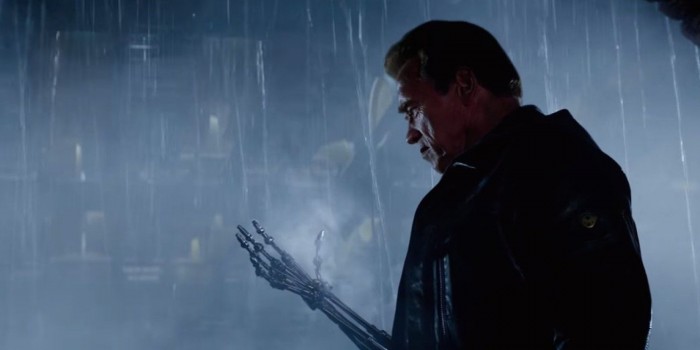 When you were in that room breaking down the story, it's obviously come about that the optimistic goal will be to make a trilogy of films. How much did you realize 'we have a big story here, we can do a trilogy' in that room?ELLISON: Right now, the audience is 100% going to decide if there is another movie, but we're wanting to hopefully plan for the success and plan for the future. My favorite trilogies of all time—I think me and Dana share that—are the Star Wars trilogy and The Lord of the Rings trilogy. And those two have one thing in common which was they were all written prior to shooting a frame of the first movie. They knew they were going to, so you weren't having to figure it out as you go along. Obviously there are very successful examples of that, The Dark Knight being one that is unbelievable, but we wanted to know where we were heading. We spent a lot of time breaking that down, and we do know what the last line of the third movie is, should we be lucky enough to get to make it.Any titles as well yet, or are you still waiting to see?ELLISON: Titles? No.GOLDBERG: No, we don't. The thing that's really important to know is that it wasn't done because we were taking it for granted that we were going to get to a second and third movie. It really was done because it helps inform who the characters are in this movie. In really being able to understand these people so well that you would have to sit and talk about what were their lives like in the portion of the film that we didn't see. We've had I can't even tell you how many...I don't want to say hours because it'll wind up being days and/or weeks of conversation about 'what did pops and Sarah [Connor] do in the interim between when she was nine years old to when we see them enter our film?' That's not in the movie. But for us to really understand who these characters were, we and Laeta and Patrick felt it was really crucial for all of us to be on the same page, that again we were sort of rowing the boat in the same direction. So to that end, it was important to know at the end of this movie, with everything that has happened to them, what would be the logical next step for these people? So again, really it's important to us for everyone to know that Terminator Genisys is a standalone film. You're not gonna walk out of this theater and feel cheated and think we left you dangling and now you have to wait for the next movie. Do we want you to want a next movie? Of course we do. Are there questions in this movie that don't get answered? Yes, that's absolutely true, but they're not questions that keep you from enjoying this film, and that was really, really important to all of us.
When you were in that room breaking down the story, it's obviously come about that the optimistic goal will be to make a trilogy of films. How much did you realize 'we have a big story here, we can do a trilogy' in that room?ELLISON: Right now, the audience is 100% going to decide if there is another movie, but we're wanting to hopefully plan for the success and plan for the future. My favorite trilogies of all time—I think me and Dana share that—are the Star Wars trilogy and The Lord of the Rings trilogy. And those two have one thing in common which was they were all written prior to shooting a frame of the first movie. They knew they were going to, so you weren't having to figure it out as you go along. Obviously there are very successful examples of that, The Dark Knight being one that is unbelievable, but we wanted to know where we were heading. We spent a lot of time breaking that down, and we do know what the last line of the third movie is, should we be lucky enough to get to make it.Any titles as well yet, or are you still waiting to see?ELLISON: Titles? No.GOLDBERG: No, we don't. The thing that's really important to know is that it wasn't done because we were taking it for granted that we were going to get to a second and third movie. It really was done because it helps inform who the characters are in this movie. In really being able to understand these people so well that you would have to sit and talk about what were their lives like in the portion of the film that we didn't see. We've had I can't even tell you how many...I don't want to say hours because it'll wind up being days and/or weeks of conversation about 'what did pops and Sarah [Connor] do in the interim between when she was nine years old to when we see them enter our film?' That's not in the movie. But for us to really understand who these characters were, we and Laeta and Patrick felt it was really crucial for all of us to be on the same page, that again we were sort of rowing the boat in the same direction. So to that end, it was important to know at the end of this movie, with everything that has happened to them, what would be the logical next step for these people? So again, really it's important to us for everyone to know that Terminator Genisys is a standalone film. You're not gonna walk out of this theater and feel cheated and think we left you dangling and now you have to wait for the next movie. Do we want you to want a next movie? Of course we do. Are there questions in this movie that don't get answered? Yes, that's absolutely true, but they're not questions that keep you from enjoying this film, and that was really, really important to all of us.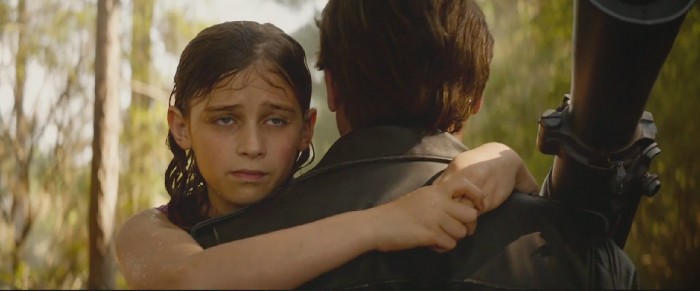 When I was watching Terminator 2 the other day after I'd seen this film, that relationship between guardian Terminator and the little girl and that one image of him saving her could have been a movie on its own, kind of like a redo of T2. Was there ever a draft that was that?ELLISON: At a point in time, there was a more expansive scene that really went into what Sarah Connor's life was like with Guardian. It was finally something that—the script was much longer at that point in time. That is something we hope we get to explore either through television or comics. There have been countless pages written on what that story was like, but for this movie, we knew we wanted to do two things from the beginning. As Dana said, it had to be a standalone movie, but we also wanted to be incredibly respectful and reverential to the Cameron films. And at the same point in time, in our mind the best Terminator movies are always present day movies. They always take place in our world. And so for that, that obviously required going to the multiple different timelines, and really the "why now" for us was mankind's relationship with technology, and how that's shifted since Jim made the original movies.
When I was watching Terminator 2 the other day after I'd seen this film, that relationship between guardian Terminator and the little girl and that one image of him saving her could have been a movie on its own, kind of like a redo of T2. Was there ever a draft that was that?ELLISON: At a point in time, there was a more expansive scene that really went into what Sarah Connor's life was like with Guardian. It was finally something that—the script was much longer at that point in time. That is something we hope we get to explore either through television or comics. There have been countless pages written on what that story was like, but for this movie, we knew we wanted to do two things from the beginning. As Dana said, it had to be a standalone movie, but we also wanted to be incredibly respectful and reverential to the Cameron films. And at the same point in time, in our mind the best Terminator movies are always present day movies. They always take place in our world. And so for that, that obviously required going to the multiple different timelines, and really the "why now" for us was mankind's relationship with technology, and how that's shifted since Jim made the original movies.
Flash back to Judgment Day in the early 90s, that was when the IBM was first coming into people's households and the internet was really an idea that people were pushing back on and rebelling against, and Hollywood was making movies like Hackers and The Net, which was these devices that everything's being recorded on now are evil. Nothing could be further from the truth today. We line up in front of Apple stores to get the newest and latest and greatest phone or to get the new iWatch, and it allowed us to really posit a world where Skynet no longer needed to bang down your front door because you invited it into your daily lives. And Kurt Vonnegut is one of my favorite authors and really that whole notion of sleepwalking into a slave society without even realizing it seemed very relevant for what's going on today at the forefront of the cutting edge. A.I. has never been more relevant. It was all of those things we wanted to focus on in this movie and allow us to do what great science-fiction does, which is hold up a mirror to what's happening today and comment on it.
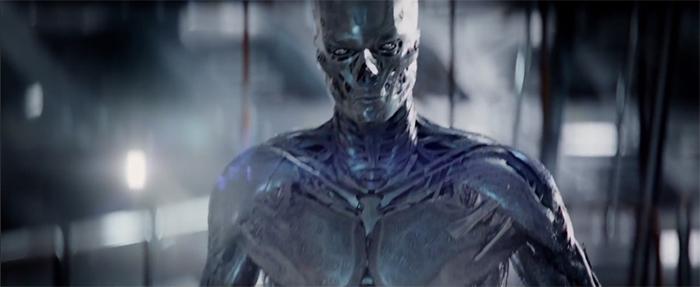 You guys created the T-3000. I believe that's the model number?GOLBDERG and ELLISON: Yes.When you guys were brainstorming and coming up with stuff, how many future Terminator-type machines have you come up with, and how did you decide on this as the version you were going to use in this movie? Are you already thinking 'we have the T-4000, but that's for movie three'?ELLISON: The T-3000, the John Connor Terminator was always the idea for this movie. Terminator movies promise groundbreaking special effects. James Cameron did that brilliantly with the mimetic poly Terminator in T2 and the thing we always loved about John Connor, and you guys have seen the movie, is that he is very much the personification of the theme in his character, both man and machine. For us, we went through...it has to be thousands of design iterations.GOLDBERG: Oh yeah.ELLISON: And had to really go off to Janek Sirrs and Shari Hanson. Janek obviously, he won the academy award for the visual effects in The Matrix, he did The Avengers and pretty much every big Marvel movie, and we were fortunate enough to pull him away, and the team at Double Negative. The character is built entirely in volume, so it's truly built on a cellular level. The joke we always used when designing it was if this character is not breaking the render farm, we have not done our job properly. All of the internal luminosity you get when his hand gets shot through and you see it rebuilding the cellular structure and all of that detail, it's thousands and thousands of tiny particles that actually make up John Connor. We knew that was the path we wanted to head down and it was a long design process but we're very proud of it.GOLDBERG: But here's a fun fact for you. Yes, all of that is exactly true, and we spent countless weeks and weeks and weeks talking about the John Connor design, and then we realized while we were on a bus in New Orleans going to a location scout with Laeta and Patrick sitting there writing that we hadn't given him his number yet. So it was the four of us on a bus heading to one of our many locations to just scout and finally Laeta was like 'what's his number? What is it?' And that was the moment that we collectively decided it was going to be 3000.ELLISON: That was what we were holding back, the John Connor reveal. We can't push this on the call sheet. We can't put this anywhere.GOLDBERG: We just kept calling it John Connor, and we're like, 'Oh shit, we can't do that, so we need a number.' Of all the thoughts, that one was about [snaps] sixty seconds.
You guys created the T-3000. I believe that's the model number?GOLBDERG and ELLISON: Yes.When you guys were brainstorming and coming up with stuff, how many future Terminator-type machines have you come up with, and how did you decide on this as the version you were going to use in this movie? Are you already thinking 'we have the T-4000, but that's for movie three'?ELLISON: The T-3000, the John Connor Terminator was always the idea for this movie. Terminator movies promise groundbreaking special effects. James Cameron did that brilliantly with the mimetic poly Terminator in T2 and the thing we always loved about John Connor, and you guys have seen the movie, is that he is very much the personification of the theme in his character, both man and machine. For us, we went through...it has to be thousands of design iterations.GOLDBERG: Oh yeah.ELLISON: And had to really go off to Janek Sirrs and Shari Hanson. Janek obviously, he won the academy award for the visual effects in The Matrix, he did The Avengers and pretty much every big Marvel movie, and we were fortunate enough to pull him away, and the team at Double Negative. The character is built entirely in volume, so it's truly built on a cellular level. The joke we always used when designing it was if this character is not breaking the render farm, we have not done our job properly. All of the internal luminosity you get when his hand gets shot through and you see it rebuilding the cellular structure and all of that detail, it's thousands and thousands of tiny particles that actually make up John Connor. We knew that was the path we wanted to head down and it was a long design process but we're very proud of it.GOLDBERG: But here's a fun fact for you. Yes, all of that is exactly true, and we spent countless weeks and weeks and weeks talking about the John Connor design, and then we realized while we were on a bus in New Orleans going to a location scout with Laeta and Patrick sitting there writing that we hadn't given him his number yet. So it was the four of us on a bus heading to one of our many locations to just scout and finally Laeta was like 'what's his number? What is it?' And that was the moment that we collectively decided it was going to be 3000.ELLISON: That was what we were holding back, the John Connor reveal. We can't push this on the call sheet. We can't put this anywhere.GOLDBERG: We just kept calling it John Connor, and we're like, 'Oh shit, we can't do that, so we need a number.' Of all the thoughts, that one was about [snaps] sixty seconds.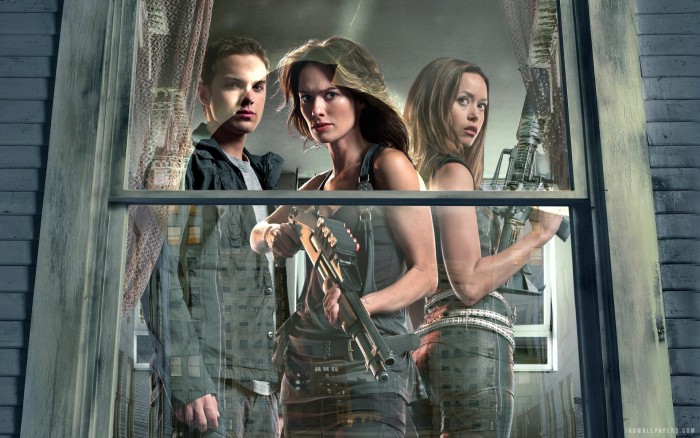 You also mentioned a TV show, and that's something that we've been very curious about. What is the status of a Terminator TV show, and what do you envision in terms of the story it might tell?ELLISON: It's something that we're developing as we speak. To speak kind of larger to that, one of the things we would love to do at Skydance—it's a very lofty goal—is to build worlds across multiple mediums. And to me, I think everyone talks in Hollywood about franchises, 'it's a franchise business, it's a franchise business'. I think that's a slightly old-fashioned word, and I think it's a world creation business. The dream for us would be to be able to obviously make films, television shows, we have a video game with Glu, comic books, and they all should be standalone experiences. If you just watch the movies or if you just watch a television show, it's a complete experience. But if you are the kind of fans that we are over this material, and you watch all of it collectively, it all interweaves to feel like a larger universe that you can experience if you're a huge fan of Terminator or any of the other franchises that we're fortunate to work on, that's really when you talk about the future of Skydance, one of the things that we really want to be a part of building.When this was first reported, the Terminator thing, it was said that it was going to somehow directly tie into this movie in some way.ELLISON: A little premature to be able to say, but I will say anything we do along those lines, it will absolutely have connective tissue. It would be a mistake and a little old-fashioned to have a television show and a movie, both based on something that actually don't cross over in any way, shape, or form.GOLDBERG: So we're working on it, to answer your question.
You also mentioned a TV show, and that's something that we've been very curious about. What is the status of a Terminator TV show, and what do you envision in terms of the story it might tell?ELLISON: It's something that we're developing as we speak. To speak kind of larger to that, one of the things we would love to do at Skydance—it's a very lofty goal—is to build worlds across multiple mediums. And to me, I think everyone talks in Hollywood about franchises, 'it's a franchise business, it's a franchise business'. I think that's a slightly old-fashioned word, and I think it's a world creation business. The dream for us would be to be able to obviously make films, television shows, we have a video game with Glu, comic books, and they all should be standalone experiences. If you just watch the movies or if you just watch a television show, it's a complete experience. But if you are the kind of fans that we are over this material, and you watch all of it collectively, it all interweaves to feel like a larger universe that you can experience if you're a huge fan of Terminator or any of the other franchises that we're fortunate to work on, that's really when you talk about the future of Skydance, one of the things that we really want to be a part of building.When this was first reported, the Terminator thing, it was said that it was going to somehow directly tie into this movie in some way.ELLISON: A little premature to be able to say, but I will say anything we do along those lines, it will absolutely have connective tissue. It would be a mistake and a little old-fashioned to have a television show and a movie, both based on something that actually don't cross over in any way, shape, or form.GOLDBERG: So we're working on it, to answer your question.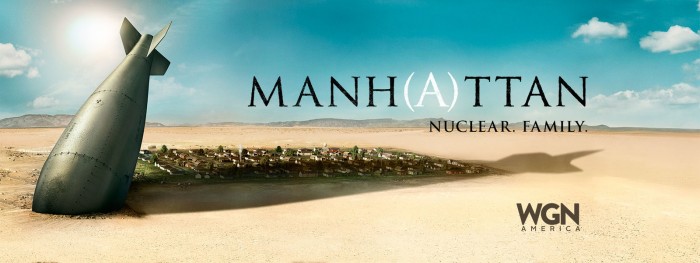 I won't ask you story questions. TV right now is the best it's ever been.GOLDBERG: We agree.I'm really curious to see what Skydance is going to bring TV. Your work on Manhattan is fantastic.ELLISON: Thanks.
I won't ask you story questions. TV right now is the best it's ever been.GOLDBERG: We agree.I'm really curious to see what Skydance is going to bring TV. Your work on Manhattan is fantastic.ELLISON: Thanks.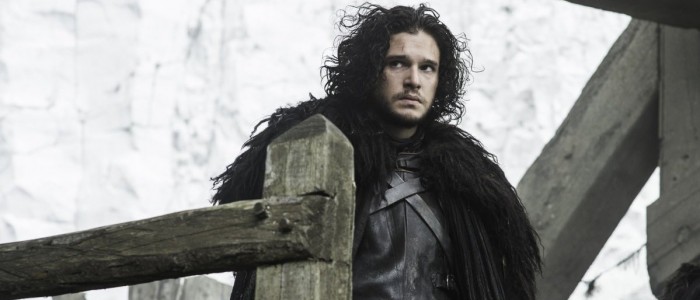 When you envision the Terminator TV show, and other shows you're developing, are you envisioning more like The Flash on CW, or more Game of Thrones on HBO?GOLDBERG: It's on a case-by-case basis. Honestly, I can't give you a blanketed answer to that. One of the great things about television is that you can tell almost any kind of story. As you were saying, right now is sort of the second golden age of television because you can watch Game of Thrones which is humongous in scope, and you can watch Breaking Bad, which in terms of scope is relatively small, but it is so brilliantly written and brilliantly acted and directed and the characters have such depth to them that you're just dying for that next episode. Or you watch Netflix, which we're happy to be in business with on Grace and Frankie, and you sit down and you stop your life and you binge watch until you actually have to sleep. So it's on a case-by-case basis. Here's the thing: at the end of the day, everything we do at Skydance is going to come back to one thing and one thing only, and that's story. It always starts with story. I had a few people as I was coming up in the business who when you asked what's the key to Hollywood, they would say 'don't be stupid, it's just the story.' It's where everything else starts, it's the thing you layer everything else on top of, so whether it's going to have huge action, which of course we're gonna do shows that fit into these sci-fi fantasy action and adventure space because we love them. But we're also going to do something like Manhattan because when we read it, we thought it was brilliant, and when we sat with Sam Shaw and we talked about his vision for that television show, we fell in love with it, and we looked at one another and said 'that's a show we'd watch'.Both of the shows you have mentioned are thirteen episodes.ELLISON: They're both thirteen, yeah.The thing that I found is that a high concept show that is 13 episodes or under is so much better than a 22-episode commitment. With, for example, Terminator or other shows that you are developing, do you envision them being 13 episodes? Do you envision going to a network or cable?ELLISON: Our gut aspiration would be a cable-driven show for something like Terminator. It's amazing to be in the network space. We have not been a part of it yet, but obviously when you're focused on making 13 episodes, it allows you to have more development time to dive deeper. That being said, there have been amazing shows on network television. One of my favorites is the first couple seasons of Alias. I'll never forget seeing J.J.'s pilot for that show and just being blown away and floored by how phenomenal it was, and so it really is on a case-by-case basis. And Alex [Kurtzman] and Bob's [Roberto Orci] writing on those first two seasons, I mean I was riveted, absolutely loved it. I really think it depends on what executives and who wants to do what at what particular point in time.GOLDBERG: Yeah, we're always gonna try to pick the place that's the best for that show. With Grace and Frankie for example, we pitched it to three places, and all three places wanted it. One was network, one was Netflix, one was HBO. It's a great luxury to be able to make that decision and ultimately when we're sitting in the room with the people who are working on the show, Marta [Kauffman] and Lily [Tomlin] and Jane [Fonda], we all decided that Netflix was the place to be. We couldn't be happier. We're having a fantastic time and we look forward to working with them again in the future on other shows, but it'll always be what is best for the subject matter.
When you envision the Terminator TV show, and other shows you're developing, are you envisioning more like The Flash on CW, or more Game of Thrones on HBO?GOLDBERG: It's on a case-by-case basis. Honestly, I can't give you a blanketed answer to that. One of the great things about television is that you can tell almost any kind of story. As you were saying, right now is sort of the second golden age of television because you can watch Game of Thrones which is humongous in scope, and you can watch Breaking Bad, which in terms of scope is relatively small, but it is so brilliantly written and brilliantly acted and directed and the characters have such depth to them that you're just dying for that next episode. Or you watch Netflix, which we're happy to be in business with on Grace and Frankie, and you sit down and you stop your life and you binge watch until you actually have to sleep. So it's on a case-by-case basis. Here's the thing: at the end of the day, everything we do at Skydance is going to come back to one thing and one thing only, and that's story. It always starts with story. I had a few people as I was coming up in the business who when you asked what's the key to Hollywood, they would say 'don't be stupid, it's just the story.' It's where everything else starts, it's the thing you layer everything else on top of, so whether it's going to have huge action, which of course we're gonna do shows that fit into these sci-fi fantasy action and adventure space because we love them. But we're also going to do something like Manhattan because when we read it, we thought it was brilliant, and when we sat with Sam Shaw and we talked about his vision for that television show, we fell in love with it, and we looked at one another and said 'that's a show we'd watch'.Both of the shows you have mentioned are thirteen episodes.ELLISON: They're both thirteen, yeah.The thing that I found is that a high concept show that is 13 episodes or under is so much better than a 22-episode commitment. With, for example, Terminator or other shows that you are developing, do you envision them being 13 episodes? Do you envision going to a network or cable?ELLISON: Our gut aspiration would be a cable-driven show for something like Terminator. It's amazing to be in the network space. We have not been a part of it yet, but obviously when you're focused on making 13 episodes, it allows you to have more development time to dive deeper. That being said, there have been amazing shows on network television. One of my favorites is the first couple seasons of Alias. I'll never forget seeing J.J.'s pilot for that show and just being blown away and floored by how phenomenal it was, and so it really is on a case-by-case basis. And Alex [Kurtzman] and Bob's [Roberto Orci] writing on those first two seasons, I mean I was riveted, absolutely loved it. I really think it depends on what executives and who wants to do what at what particular point in time.GOLDBERG: Yeah, we're always gonna try to pick the place that's the best for that show. With Grace and Frankie for example, we pitched it to three places, and all three places wanted it. One was network, one was Netflix, one was HBO. It's a great luxury to be able to make that decision and ultimately when we're sitting in the room with the people who are working on the show, Marta [Kauffman] and Lily [Tomlin] and Jane [Fonda], we all decided that Netflix was the place to be. We couldn't be happier. We're having a fantastic time and we look forward to working with them again in the future on other shows, but it'll always be what is best for the subject matter.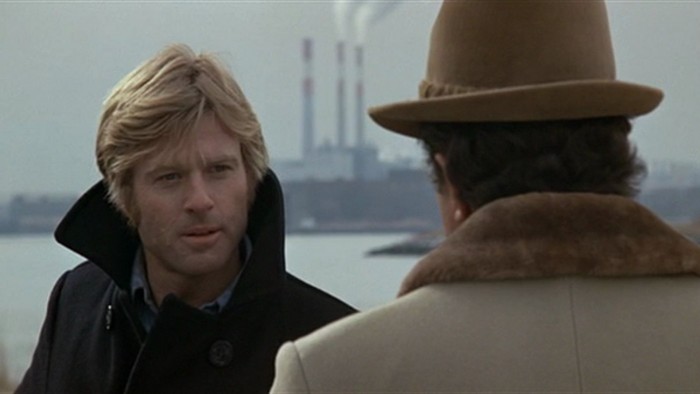 When you were talking about TV, I was really interested in Three Days of the Condor, being a 70s film fanatic. Was it the story which attracted you to that to make that into a series?GOLDBERG: Yeah, I mean we started talking about the idea of Condor in general, and for all of the CIA thriller type movies that have been made, that just that word, you say Condor, and everybody immediately knows what you're talking about. You don't even have to say Three Days of. When you say Condor people go 'oh, that was great'. And we just thought it's a great title and the inherent setup of that movie would be so great for a television show in this day and age, when between technology and the lack of privacy and the international landscape of what goes on, how rich is that gonna be? We hired Jason Smilovic, who is an incredible writer, and he's worked hand in hand with Marcy Ross, who runs our television division, and has created a script and bible that we think is just incredible.
When you were talking about TV, I was really interested in Three Days of the Condor, being a 70s film fanatic. Was it the story which attracted you to that to make that into a series?GOLDBERG: Yeah, I mean we started talking about the idea of Condor in general, and for all of the CIA thriller type movies that have been made, that just that word, you say Condor, and everybody immediately knows what you're talking about. You don't even have to say Three Days of. When you say Condor people go 'oh, that was great'. And we just thought it's a great title and the inherent setup of that movie would be so great for a television show in this day and age, when between technology and the lack of privacy and the international landscape of what goes on, how rich is that gonna be? We hired Jason Smilovic, who is an incredible writer, and he's worked hand in hand with Marcy Ross, who runs our television division, and has created a script and bible that we think is just incredible.
ELLISON: Just to add to that, one of the things that I love and Jason talks about it a lot, is the original Condor very much predicted what happened...the original movie ends with the prediction of the war in the Middle East over oil, and there are writers like Tom Clancy who when you read his books you always felt like you were getting a peek behind the curtain as to what was going to happen next. That doesn't really exist today, so one of the things we very much hope that Condor is able to do is very much be the Condor for this generation and very much be predictive in regards to what's going to be happening with future events.
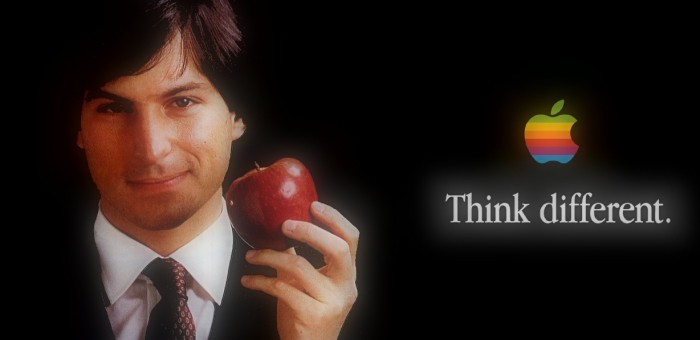 I wanted to skip for a second. You mentioned Steve Jobs earlier, and I learned that he was one of your mentors. I wanted to find out how did that come about and what was the experience like? What did you learn from that?ELLISON: I had the incredible luxury that Steve happens to my dad's best friend, so he was like an uncle growing up. To give you an example, at his last wedding, there were six people there. It was me, my sister, Steve, Laurene [Powell], and Tom Lantos and his wife, the former congressmen. He was a very, very close friend and truly the Thomas Edison of his time, and I was fortunate enough in building this company to be able to talk to him about it throughout the entirety of it. And a story I'll never forget, because in irony it was actually the day they were launching the second iPhone, we were getting close to closing our deal at Paramount with Skydance, and I told Steve I wanted to talk to him about it. He said 'why don't you get on a plane and fly out here tomorrow?' And I said 'you're launching the iPhone tomorrow.' He was like 'I don't care. Get up here.' I sat down and pitched him the entire company, the way we had been pitching everybody else on our fundraising tour, and Steve looked at me in the way that only Steve Jobs can and he goes 'this isn't gonna work.' [Laughs] And I was like 'alright, why?' And he said 'you know the answer, you're just not thinking about it.' And I didn't, I was kind of floored at the moment in time, and he was like 'look, why does Pixar work?' He said 'the biggest mistake everybody makes about Pixar is that they think we were successful because we created 3-D animation, and nothing could be further from the truth. We simply went back to a world where we found out how to make movies better than anybody else.'
I wanted to skip for a second. You mentioned Steve Jobs earlier, and I learned that he was one of your mentors. I wanted to find out how did that come about and what was the experience like? What did you learn from that?ELLISON: I had the incredible luxury that Steve happens to my dad's best friend, so he was like an uncle growing up. To give you an example, at his last wedding, there were six people there. It was me, my sister, Steve, Laurene [Powell], and Tom Lantos and his wife, the former congressmen. He was a very, very close friend and truly the Thomas Edison of his time, and I was fortunate enough in building this company to be able to talk to him about it throughout the entirety of it. And a story I'll never forget, because in irony it was actually the day they were launching the second iPhone, we were getting close to closing our deal at Paramount with Skydance, and I told Steve I wanted to talk to him about it. He said 'why don't you get on a plane and fly out here tomorrow?' And I said 'you're launching the iPhone tomorrow.' He was like 'I don't care. Get up here.' I sat down and pitched him the entire company, the way we had been pitching everybody else on our fundraising tour, and Steve looked at me in the way that only Steve Jobs can and he goes 'this isn't gonna work.' [Laughs] And I was like 'alright, why?' And he said 'you know the answer, you're just not thinking about it.' And I didn't, I was kind of floored at the moment in time, and he was like 'look, why does Pixar work?' He said 'the biggest mistake everybody makes about Pixar is that they think we were successful because we created 3-D animation, and nothing could be further from the truth. We simply went back to a world where we found out how to make movies better than anybody else.'
And he talked a lot about how free agency was created because the golden age of Hollywood was when the studios had a very firm handle on the talent, but because they did not treat them appropriately, didn't compensate them appropriately, that created the free agency, and we live in the world we exist in now. Steve adjusted that by actually making the talent his partners, and by treating everybody well both creatively and economically, and really changing the model. And as Dana said, that was really what led to, when he talked about the brain trust, really going to that idea where we had a core group of both executives and filmmakers that we could work with over and over and over again, because any one person can make a bad movie. Some of the greatest filmmakers of all time have made bad films, but when you get a group of people together, five really talented people will usually not miss. It doesn't mean that on their own that would necessarily go differently, but that was really the model.
From that moment on, we went back and restructured the company and changed it, and re-pitched it to him, and he said 'that's gonna work better.' I was very fortunate and truly blessed to have him as a friend and as a mentor and to be able to work with Dana Goldberg and Marcy Ross and Don Granger who are these incredibly talented producers and storytellers at our company and to be able to work with filmmakers like J.J. Abrams and Brad Bird and Chris McQuarrie and Alan Taylor and writers like Laeta Kalogridis and Patrick Lussier, Alex Kurtzman, Damon Lindelof, our company is what it is because of the incredible people that we get to work with.
GOLDBERG: Just to stay on that, you can use Terminator Genisys as a specific with Laeta and Patrick and Alan, but we've been lucky enough that it really applies to most of the films we've been involved in, which is a really nice gathering of people who are talented but where the best idea wins. It really doesn't matter who the great idea comes from, it really doesn't. Laeta and Patrick love to kid around that they'll listen to the guy at Starbucks if he has something really intelligent to say about Terminator. It sounds like it should be common sense, it should be the thing that everybody does, and we all know people where unfortunately that doesn't necessarily apply because arrogance and ego can get in the way. We have been incredibly fortunate to work with such talented filmmakers who all feel that way where it's just whatever's best for the movie, because then the movie wins.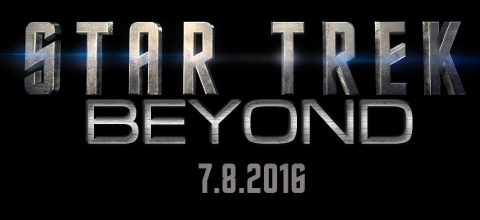 You bring up Damon and Alex, and I want to segue into a certain Star Trek sequel that I believe starts filming soon. Is it called Star Trek Beyond?GOLDBERG: To be determined.What can you tell people about when it's filming and where?ELLISON: We start shooting in ten days and we're shooting in Vancouver and Dubai.Dubai is an interesting place for an alien planet.ELLISON and GOLDBERG: Could be [laughs].
You bring up Damon and Alex, and I want to segue into a certain Star Trek sequel that I believe starts filming soon. Is it called Star Trek Beyond?GOLDBERG: To be determined.What can you tell people about when it's filming and where?ELLISON: We start shooting in ten days and we're shooting in Vancouver and Dubai.Dubai is an interesting place for an alien planet.ELLISON and GOLDBERG: Could be [laughs].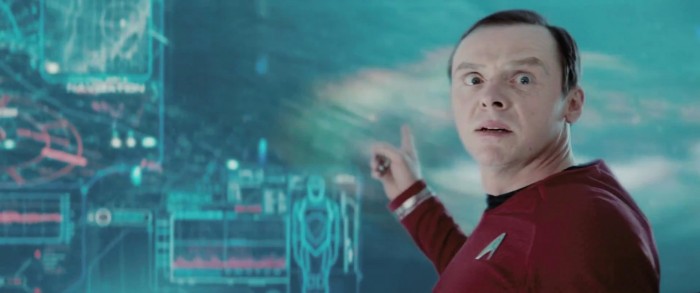 Well talk a little bit about where you are right now and the fact that next year is the 50th anniversary and there has been a little bit of turmoil behind the scenes. Could you talk a little bit about how you got to Simon [Pegg] who's working on co-writing the screenplay?GOLDBERG: First of all, yes, it's the 50th anniversary, and trust me everybody involved feels an incredible responsibility to deliver for the 50th anniversary edition of Star Trek, and we are all such fans and such Star Trek geeks, everyone involved in this franchise. So I think we absolutely understand the very high hurdle that everyone has to jump for the 50th anniversary of Star Trek. Then Justin Lin stepped in and who knew Justin Lin was such a Star Trek fan? And he is. He met with J.J. and Lindsey Weber at Bad Robot and they fell in love with him, and brought him in to meet with us and to meet with everybody at Paramount and pitched a version of the film that we just thought 'wow, that has huge potential.' We're not allowed to talk about the specifics of the film to say the least, but what we can tell you is there are some sequences that we have seen in pre-vis that are just incredible.We work in the world of online, and there are a lot of cynical fanboys there. What reassurances do you have?ELLISON: You're wearing a Bad Robot t-shirt right now, right? So you know how shrouded in secrecy everything over there always is, and we don't want to say anything that will give anything away about the film. We want to make sure that we preserve everything so that when an audience goes to see it for the first time or when the first trailer comes out, everything is new.GOLDBERG: I feel like you're a test. It's like a Mission: Impossible mask. We're gonna actually say something, you're gonna rip the mask off and be J.J. [Laughs]I honestly wasn't trying to get story details from you.ELLISON: We all love Star Trek. As for the specifics of the screenplay, we're just not at liberty to say. It stays in the mystery box.
Well talk a little bit about where you are right now and the fact that next year is the 50th anniversary and there has been a little bit of turmoil behind the scenes. Could you talk a little bit about how you got to Simon [Pegg] who's working on co-writing the screenplay?GOLDBERG: First of all, yes, it's the 50th anniversary, and trust me everybody involved feels an incredible responsibility to deliver for the 50th anniversary edition of Star Trek, and we are all such fans and such Star Trek geeks, everyone involved in this franchise. So I think we absolutely understand the very high hurdle that everyone has to jump for the 50th anniversary of Star Trek. Then Justin Lin stepped in and who knew Justin Lin was such a Star Trek fan? And he is. He met with J.J. and Lindsey Weber at Bad Robot and they fell in love with him, and brought him in to meet with us and to meet with everybody at Paramount and pitched a version of the film that we just thought 'wow, that has huge potential.' We're not allowed to talk about the specifics of the film to say the least, but what we can tell you is there are some sequences that we have seen in pre-vis that are just incredible.We work in the world of online, and there are a lot of cynical fanboys there. What reassurances do you have?ELLISON: You're wearing a Bad Robot t-shirt right now, right? So you know how shrouded in secrecy everything over there always is, and we don't want to say anything that will give anything away about the film. We want to make sure that we preserve everything so that when an audience goes to see it for the first time or when the first trailer comes out, everything is new.GOLDBERG: I feel like you're a test. It's like a Mission: Impossible mask. We're gonna actually say something, you're gonna rip the mask off and be J.J. [Laughs]I honestly wasn't trying to get story details from you.ELLISON: We all love Star Trek. As for the specifics of the screenplay, we're just not at liberty to say. It stays in the mystery box.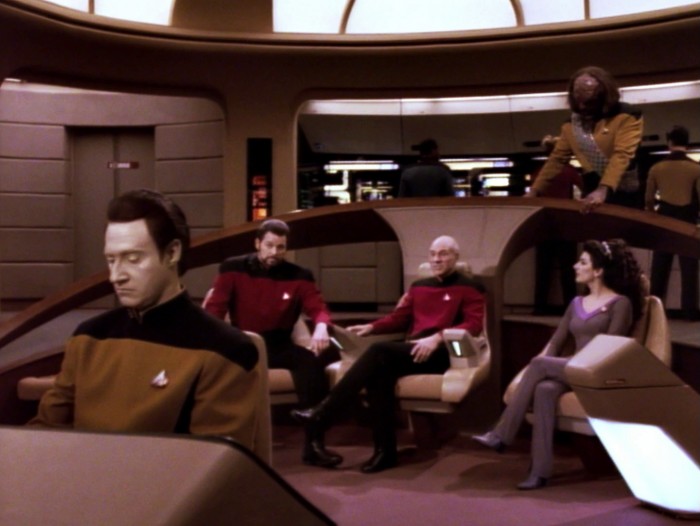 I have a question that hopefully you can answer that is not about the story. One of the things about the Star Trek movies is that they're big budget and they're big spectacles. Everyone's going after a four-quadrant movie with a movie you spend that much money on. One of the things I miss tremendously and I know I represent fandom, is Star Trek on TV, where you can tell smaller stories, more sci-fi, more of a metaphor or an allegory for what's going on, you can go deeper into the sci-fi. A lot of us, myself included, want to see Star Trek on the big screen and on the small screen. What is the status of Star Trek on the small screen? Is Skydance involved in that?ELLISON: It's something that we would love to be involved in. As I'm sure everybody knows, the rights situation given the CBS and Paramount divorce on the Star Trek rights is very, very complicated. The exact status of it is absolutely something being worked on. We would love to be involved, but all to be determined at this time.GOLDBERG: You're preaching to the converted. We would love it, both as fans and as people who would want to be involved in the making of them. We would love it. Everything you just said is right. It goes with what we were talking about before with television is you can just take more time to tell very specific stories and it would be fantastic. It's not something we control, sadly.ELLISON: Just for example how much we love it is when we were talking about Terminator recently and the episode we kept referencing was obviously whether or not they argue if Data actually doesn't wanna get transferred, if he actually has a right and has free will and is a human being and switches him off. It's amazing, the television show explored these incredibly deep phenomenal themes that we would absolutely love to do and be a part of, and we wish it was entirely up to us.Is that the reason why there hasn't been a TV show in all of these years? Because it's such a popular property around the world, you would think that they'd get their head out of their ass and do something with it.GOLDBERG: You said that, we did not [laughs].ELLISON: It's wildly, wildly complicated. Just speaking towards going to something we do control, not trying to get myself into trouble by answering this bluntly, because you said it appropriately, is the Terminator rights were scattered all over the world prior to us getting involved. And it's when a franchise has been around for thirty or fifty years, different people make different deals at different points in time, and it really took for Terminator the previous owner actually going bankrupt and going through obviously bankruptcy court, and then even after that it took a year to clean up the straggling pieces that that process did not clean up. We're very thankful that the rights now all revolve under our house so they are now all at Skydance so we can control all assets of the property. That's not always the case with franchises, and when they're fifty years old, there's a lot of complicated deals that have been made that sometimes prevent things that might seem obvious that need to happen from happening.
I have a question that hopefully you can answer that is not about the story. One of the things about the Star Trek movies is that they're big budget and they're big spectacles. Everyone's going after a four-quadrant movie with a movie you spend that much money on. One of the things I miss tremendously and I know I represent fandom, is Star Trek on TV, where you can tell smaller stories, more sci-fi, more of a metaphor or an allegory for what's going on, you can go deeper into the sci-fi. A lot of us, myself included, want to see Star Trek on the big screen and on the small screen. What is the status of Star Trek on the small screen? Is Skydance involved in that?ELLISON: It's something that we would love to be involved in. As I'm sure everybody knows, the rights situation given the CBS and Paramount divorce on the Star Trek rights is very, very complicated. The exact status of it is absolutely something being worked on. We would love to be involved, but all to be determined at this time.GOLDBERG: You're preaching to the converted. We would love it, both as fans and as people who would want to be involved in the making of them. We would love it. Everything you just said is right. It goes with what we were talking about before with television is you can just take more time to tell very specific stories and it would be fantastic. It's not something we control, sadly.ELLISON: Just for example how much we love it is when we were talking about Terminator recently and the episode we kept referencing was obviously whether or not they argue if Data actually doesn't wanna get transferred, if he actually has a right and has free will and is a human being and switches him off. It's amazing, the television show explored these incredibly deep phenomenal themes that we would absolutely love to do and be a part of, and we wish it was entirely up to us.Is that the reason why there hasn't been a TV show in all of these years? Because it's such a popular property around the world, you would think that they'd get their head out of their ass and do something with it.GOLDBERG: You said that, we did not [laughs].ELLISON: It's wildly, wildly complicated. Just speaking towards going to something we do control, not trying to get myself into trouble by answering this bluntly, because you said it appropriately, is the Terminator rights were scattered all over the world prior to us getting involved. And it's when a franchise has been around for thirty or fifty years, different people make different deals at different points in time, and it really took for Terminator the previous owner actually going bankrupt and going through obviously bankruptcy court, and then even after that it took a year to clean up the straggling pieces that that process did not clean up. We're very thankful that the rights now all revolve under our house so they are now all at Skydance so we can control all assets of the property. That's not always the case with franchises, and when they're fifty years old, there's a lot of complicated deals that have been made that sometimes prevent things that might seem obvious that need to happen from happening.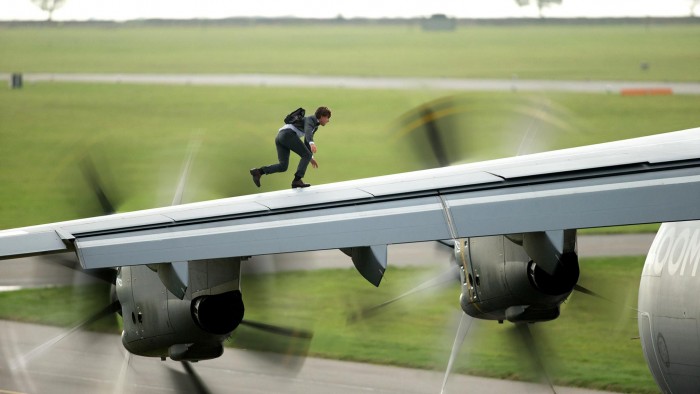 I was just gonna ask about Rogue Nation. I'm super excited for the movie and I've already heard really good buzz. Can you talk about some of the test screenings and some of the reactions to that?GOLDBERG: We will talk about that all day long [laughs].I'm so excited to see it. It just keeps getting better and better with each episode of the series.GOLDBERG: It is getting better and better with each episode. Credit to Chris McQuarrie and Tom Cruise and Don Granger who works with us, and it's a phenomenal movie. It's a phenomenal movie and I think I'm officially allowed to say that we tested even higher than Ghost Protocol. There's not a lot of times in your life, you dream about them, but those moments you go to a preview screening and everybody's there, your director, your star, the studio, you sit there and from the second the movie starts, you're just like 'oh, this feels really, really good'. It feels that way from top to bottom, and then they walk in and they tell you what the audience thought and it felt even better to the audience than it did to you, and that's how we felt in Arizona a couple weeks ago.
I was just gonna ask about Rogue Nation. I'm super excited for the movie and I've already heard really good buzz. Can you talk about some of the test screenings and some of the reactions to that?GOLDBERG: We will talk about that all day long [laughs].I'm so excited to see it. It just keeps getting better and better with each episode of the series.GOLDBERG: It is getting better and better with each episode. Credit to Chris McQuarrie and Tom Cruise and Don Granger who works with us, and it's a phenomenal movie. It's a phenomenal movie and I think I'm officially allowed to say that we tested even higher than Ghost Protocol. There's not a lot of times in your life, you dream about them, but those moments you go to a preview screening and everybody's there, your director, your star, the studio, you sit there and from the second the movie starts, you're just like 'oh, this feels really, really good'. It feels that way from top to bottom, and then they walk in and they tell you what the audience thought and it felt even better to the audience than it did to you, and that's how we felt in Arizona a couple weeks ago.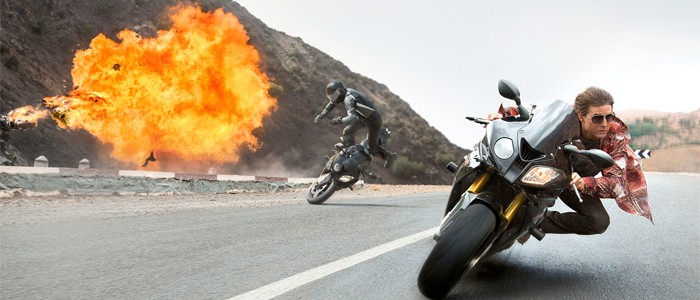 Tom Cruise is known as someone who likes to do his own stunts. He's a bit of a daredevil. Has there ever been an instance where you've had to say no to him just for fear of his life?ELLISON: In development of certain scenes we've said maybe not such a good idea.Such as the plane scene for example?ELLISON: No, no, that's Tom on the side of the plane. There is not a single stunt double in Rogue Nation.
Tom Cruise is known as someone who likes to do his own stunts. He's a bit of a daredevil. Has there ever been an instance where you've had to say no to him just for fear of his life?ELLISON: In development of certain scenes we've said maybe not such a good idea.Such as the plane scene for example?ELLISON: No, no, that's Tom on the side of the plane. There is not a single stunt double in Rogue Nation.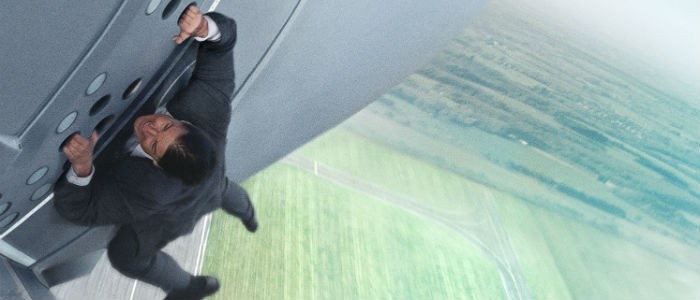 I knew it was him, but did you advise against it?ELLISON: No, we were 100% in support of that. These stunts are rehearsed to within an inch of their life, but the one thing that Tom feels very passionately about, and it really comes from a place of wanting to entertain the audience, is in a movie like Mission: Impossible, where it's possible to do these things using a camera that doesn't rely on the CG that Star Trek or Terminator relied on, when you actually see Tom Cruise holding onto the side of the airplane and the camera doesn't cut, you get this pit in your stomach that's just uncomfortable. It puts the audience there in a way that you could never do with CG, and there is an underwater sequence in the movie that has only been teased out in the trailers thus far where Tom worked with three divers to learn how to hold his breath for six minutes, and the tension you get in that sequence when you're underwater and you see it's Tom and the camera is not cutting, you're at the edge of your seat. And that all comes from a place of storytelling and wanting to entertain an audience and Tom is the most dedicated and hardest working movie star we have ever worked with, and he is sensational in Rogue Nation.
I knew it was him, but did you advise against it?ELLISON: No, we were 100% in support of that. These stunts are rehearsed to within an inch of their life, but the one thing that Tom feels very passionately about, and it really comes from a place of wanting to entertain the audience, is in a movie like Mission: Impossible, where it's possible to do these things using a camera that doesn't rely on the CG that Star Trek or Terminator relied on, when you actually see Tom Cruise holding onto the side of the airplane and the camera doesn't cut, you get this pit in your stomach that's just uncomfortable. It puts the audience there in a way that you could never do with CG, and there is an underwater sequence in the movie that has only been teased out in the trailers thus far where Tom worked with three divers to learn how to hold his breath for six minutes, and the tension you get in that sequence when you're underwater and you see it's Tom and the camera is not cutting, you're at the edge of your seat. And that all comes from a place of storytelling and wanting to entertain an audience and Tom is the most dedicated and hardest working movie star we have ever worked with, and he is sensational in Rogue Nation.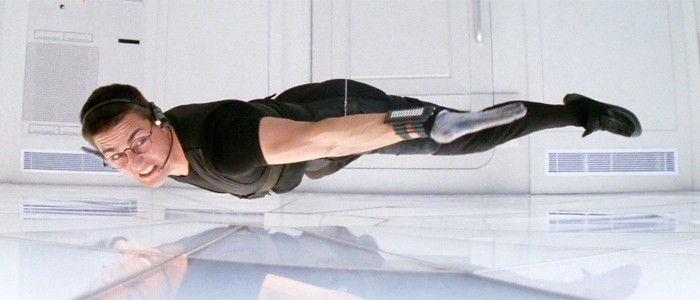 You've been working with him quite a lot.GOLDBERG: We love working with Tom. The truth is Tom spoils you because you work with Tom and you then have the expectation that of course every movie star/producer is going to be like that. Because he's typically the first person on the set and the last person on the set. And he will openly look at you and say 'I don't expect you to work harder than me, but I expect you to keep up with me.' He says it by example, which is beyond impressive. We all kid about Tom, the stunts, and that's he insane, an adrenaline junkie, all of that, all of which is true, but I also really don't wanna undermine one very clear fact which is the thought, the planning, the meticulous safety that goes into these things that he is involved with from second one is just so impressive.
You've been working with him quite a lot.GOLDBERG: We love working with Tom. The truth is Tom spoils you because you work with Tom and you then have the expectation that of course every movie star/producer is going to be like that. Because he's typically the first person on the set and the last person on the set. And he will openly look at you and say 'I don't expect you to work harder than me, but I expect you to keep up with me.' He says it by example, which is beyond impressive. We all kid about Tom, the stunts, and that's he insane, an adrenaline junkie, all of that, all of which is true, but I also really don't wanna undermine one very clear fact which is the thought, the planning, the meticulous safety that goes into these things that he is involved with from second one is just so impressive.
So when you asked the question about whether we've ever said no, yes when we sit around rooms like this and we're talking and we're in the development phase, and somebody goes 'I know, let's dangle him outside of a...' and you go 'okay, let's not do that. Let's not kill Tom Cruise.' Rule number one: do not kill Tom Cruise. But by the time you get to a plane, that's months and months and months literally of work has gone into making sure by some of the most talented crew in the business, to making sure that when we put him on that plane, every precaution has been taken. Now by the way, it doesn't mean something can't go wrong. If you ask Tom, the thing that we're most afraid of is a bird strike because if it just in the same way sadly birds have affected planes in normal life, if there was a random bird in the wrong place when we were shooting that sequence, it could have been really, really bad. But in terms of everything that can be controlled, he is meticulous in his preparation.
How did changing the release date impact getting that movie to the screen?GOLDBERG: Chris McQuarrie hasn't slept in months.ELLISON: There is not a moment of sacrifice to the quality of film in moving it forward that way, but it required everybody led by Chris McQuarrie to work twenty plus hours a day. I think when everyone sees this movie if they didn't already think it after Jack Reacher, they are going to see that Chris McQuarrie is a truly visionary filmmaker.GOLDBERG: He sort of ruined it for other filmmakers. We were chatting with some people yesterday who said 'so now just anybody can say you're going to move your movie up by five months, and just get it done, right? That's not going to be a problem.' Because that is actually how it happened. It was a meeting that was a lot like this, it was like 'well you know what, it would be the perfect date, July 31st, but you guys can't get in ready in time.' Yeah, we can. And it was Tom and it was Chris. They both said 'yeah, we can. We'll get it ready. We'll do it.' And they have not sacrificed one thing. They have killed themselves, our whole crew. Eddie Hamilton, our editor, they have worked non-stop on this movie, and genuinely cannot wait for you guys to see the result. It is beautiful filmmaking.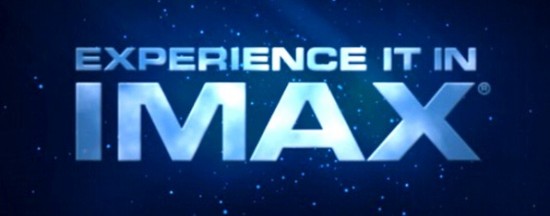 Is it IMAX also? Some of the scenes?ELLISON: It's being DMR to release in IMAX. We didn't get to shoot anything natively because at the time, every single IMAX screen was taken up by Star Wars and we thought we were releasing in December. Otherwise, we would've loved to shoot IMAX. It's an amazing format.
Is it IMAX also? Some of the scenes?ELLISON: It's being DMR to release in IMAX. We didn't get to shoot anything natively because at the time, every single IMAX screen was taken up by Star Wars and we thought we were releasing in December. Otherwise, we would've loved to shoot IMAX. It's an amazing format.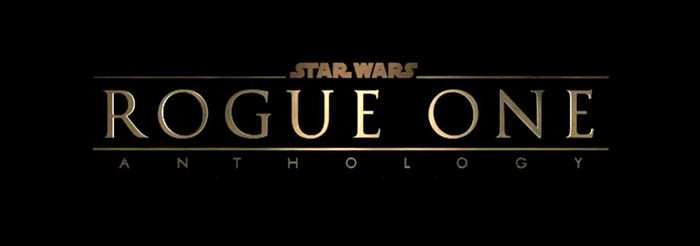 You mentioned Star Wars. There's this other little film under the Star Wars banner that has in Rogue in the title, and I was wondering if that caused any drama?ELLISON: Fortunately, we had settled on the title long before that was released. There was a little bit of behind the scenes with Paramount and Disney but everybody was able to play nice together.Did you have to okay Disney's title?ELLISON: We had the title beforehand.GOLDBERG: It's a line in our movie. It's not something that was created late in the game.ELLISON: And since the Disney and Star Wars film comes out over a year after us, there's not as much conflict as other instances in the past where it's been 'we want the same title and we want to release on the same weekend or within a month of each other.' So fortunately there was no drama on that one.
You mentioned Star Wars. There's this other little film under the Star Wars banner that has in Rogue in the title, and I was wondering if that caused any drama?ELLISON: Fortunately, we had settled on the title long before that was released. There was a little bit of behind the scenes with Paramount and Disney but everybody was able to play nice together.Did you have to okay Disney's title?ELLISON: We had the title beforehand.GOLDBERG: It's a line in our movie. It's not something that was created late in the game.ELLISON: And since the Disney and Star Wars film comes out over a year after us, there's not as much conflict as other instances in the past where it's been 'we want the same title and we want to release on the same weekend or within a month of each other.' So fortunately there was no drama on that one.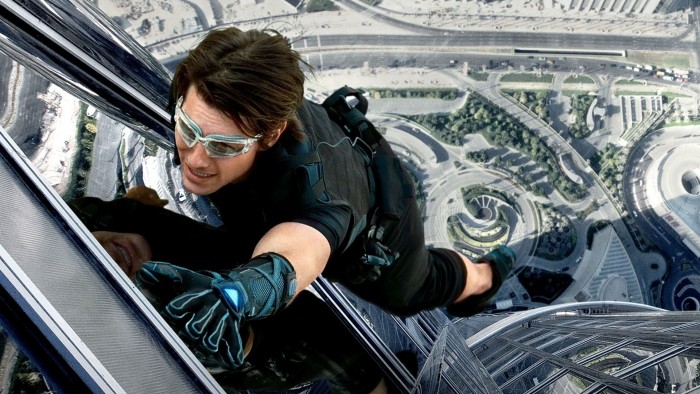 Do you want to talk a little bit about the cost of insuring Tom Cruise on these movies and does it keep on going up with each of these films?ELLISON: One of my favorite moments, we actually didn't have on this movie, but on Ghost Protocol, we wanted to hang Tom off the side of a building and we actually couldn't get insurance and Tom wanted to fire the insurance company [laughs]. And we did and we got somebody to insure the movie. A hilarious but true story is it was the day we were actually rehearsing the Burj Khalifa, it was the whole stunt team, Tom on the side of the building, me, Brad Bird, and Bryan Burk, and Tom was padded up, had the helmet on, and we had rehearsed for months inside these hangars and sound stages and Tom kicked off the building as he would describe it spectacularly crashed into it head first, and me and Burk and Brad were like 'this is a really bad idea'. In true Tom fashion, while we were all arguing amongst ourselves about how we were the largest idiots known to mankind for putting ourselves in this situation, Tom reset back to one with the stunt guys and nailed it perfectly on the second rehearsal. And we all kind of looked at each other and were like 'well, that's why he's Tom Cruise.' We shot it the next day, we shot it twice and it was spectacular.
Do you want to talk a little bit about the cost of insuring Tom Cruise on these movies and does it keep on going up with each of these films?ELLISON: One of my favorite moments, we actually didn't have on this movie, but on Ghost Protocol, we wanted to hang Tom off the side of a building and we actually couldn't get insurance and Tom wanted to fire the insurance company [laughs]. And we did and we got somebody to insure the movie. A hilarious but true story is it was the day we were actually rehearsing the Burj Khalifa, it was the whole stunt team, Tom on the side of the building, me, Brad Bird, and Bryan Burk, and Tom was padded up, had the helmet on, and we had rehearsed for months inside these hangars and sound stages and Tom kicked off the building as he would describe it spectacularly crashed into it head first, and me and Burk and Brad were like 'this is a really bad idea'. In true Tom fashion, while we were all arguing amongst ourselves about how we were the largest idiots known to mankind for putting ourselves in this situation, Tom reset back to one with the stunt guys and nailed it perfectly on the second rehearsal. And we all kind of looked at each other and were like 'well, that's why he's Tom Cruise.' We shot it the next day, we shot it twice and it was spectacular.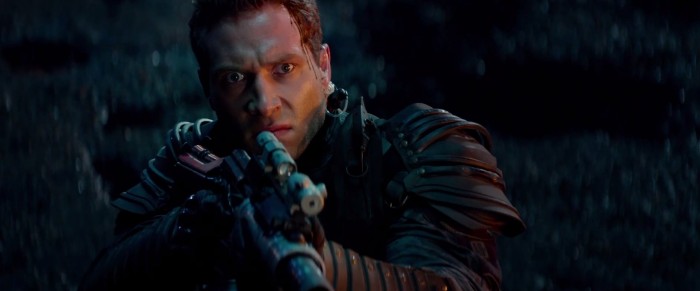 GOLDBERG: A funny story that actually oddly ties together Terminator and this exact topic, Jai Courtney loves to ride motorcycles in real life. He owns a few, it's his favorite thing in the world to do. And he told our insurance company that on Terminator Genisys and they told him he was not allowed to ride a motorcycle during the filming of our movie in order to be able to get insured. The very next phone call I got from him us 'can somebody please explain to me how you get insurance for Tom Cruise to hang off the Burj and I can't ride a motorcycle around New Orleans? How is that fair?' True story.That is awesome.GOLDBERG: Because there's a lot more care that goes into Tom Cruise hanging off the Burj than you driving around New Orleans.
GOLDBERG: A funny story that actually oddly ties together Terminator and this exact topic, Jai Courtney loves to ride motorcycles in real life. He owns a few, it's his favorite thing in the world to do. And he told our insurance company that on Terminator Genisys and they told him he was not allowed to ride a motorcycle during the filming of our movie in order to be able to get insured. The very next phone call I got from him us 'can somebody please explain to me how you get insurance for Tom Cruise to hang off the Burj and I can't ride a motorcycle around New Orleans? How is that fair?' True story.That is awesome.GOLDBERG: Because there's a lot more care that goes into Tom Cruise hanging off the Burj than you driving around New Orleans.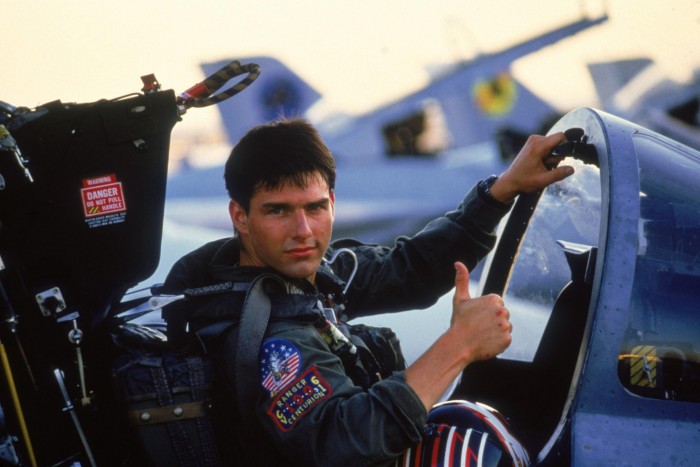 You're also a thrill seeker; you're a pilot. And you have Top Gun 2 on your list, which is also with Tom Cruise. Can you talk a little bit about that?ELLISON: Absolutely. I started flying aerobatics when I was thirteen years old, actually me and my dad took my first lesson on my thirteenth birthday. By the time I was seventeen, I was flying air shows and have thousands of hours flying surface level aerobatics. I absolutely love it. I've got three hundred skydives, used to sky surf until that put me in the hospital really badly so I thought maybe let's not do that anymore, but love aviation, and Top Gun definitely fits into the seminal movie of my childhood, and as a pilot, that is really the movie. Justin Marks is writing the screenplay right now. He has a phenomenal take to really update that world for what fighter pilots in the navy has turned into today. There is an amazing role for Maverick in the movie and there is no Top Gun without Maverick, and it is going to be Maverick playing Maverick. It is I don't think what people are going to expect, and we are very, very hopeful that we get to make the movie very soon. But like all things, it all comes down to the script, and Justin is writing as we speak.You're gonna do what a lot of sequels have been doing now which is incorporate real use of time from the first one to now.ELLISON and GOLDBERG: Absolutely.
You're also a thrill seeker; you're a pilot. And you have Top Gun 2 on your list, which is also with Tom Cruise. Can you talk a little bit about that?ELLISON: Absolutely. I started flying aerobatics when I was thirteen years old, actually me and my dad took my first lesson on my thirteenth birthday. By the time I was seventeen, I was flying air shows and have thousands of hours flying surface level aerobatics. I absolutely love it. I've got three hundred skydives, used to sky surf until that put me in the hospital really badly so I thought maybe let's not do that anymore, but love aviation, and Top Gun definitely fits into the seminal movie of my childhood, and as a pilot, that is really the movie. Justin Marks is writing the screenplay right now. He has a phenomenal take to really update that world for what fighter pilots in the navy has turned into today. There is an amazing role for Maverick in the movie and there is no Top Gun without Maverick, and it is going to be Maverick playing Maverick. It is I don't think what people are going to expect, and we are very, very hopeful that we get to make the movie very soon. But like all things, it all comes down to the script, and Justin is writing as we speak.You're gonna do what a lot of sequels have been doing now which is incorporate real use of time from the first one to now.ELLISON and GOLDBERG: Absolutely.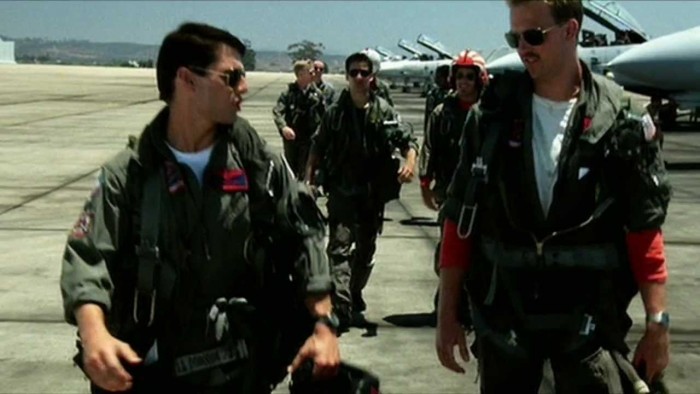 One of the things about the first movie is the visuals and the dogfights were really well done, and I would imagine now with modern technology you can do action in a whole new way. Is that already being thought about in terms of the action set pieces, or in 3-D?ELLISON: Absolutely, I think this is a movie that should be in 3-D and in IMAX, and again something that you can shoot practically. As everyone knows with Tom, he is 100% going to want to be in those airplanes shooting it practically. When you look at the world of dogfighting, what's interesting about it is that it's not a world that exists to the same degree when the original movie came out. This world has not been explored. It is very much a world we live in today where it's drone technology and fifth generation fighters are really what the United States Navy is calling the last man-made fighter that we're actually going to produce so it's really exploring the end of an era of dogfighting and fighter pilots and what that culture is today are all fun things that we're gonna get to dive into in this movie.
One of the things about the first movie is the visuals and the dogfights were really well done, and I would imagine now with modern technology you can do action in a whole new way. Is that already being thought about in terms of the action set pieces, or in 3-D?ELLISON: Absolutely, I think this is a movie that should be in 3-D and in IMAX, and again something that you can shoot practically. As everyone knows with Tom, he is 100% going to want to be in those airplanes shooting it practically. When you look at the world of dogfighting, what's interesting about it is that it's not a world that exists to the same degree when the original movie came out. This world has not been explored. It is very much a world we live in today where it's drone technology and fifth generation fighters are really what the United States Navy is calling the last man-made fighter that we're actually going to produce so it's really exploring the end of an era of dogfighting and fighter pilots and what that culture is today are all fun things that we're gonna get to dive into in this movie.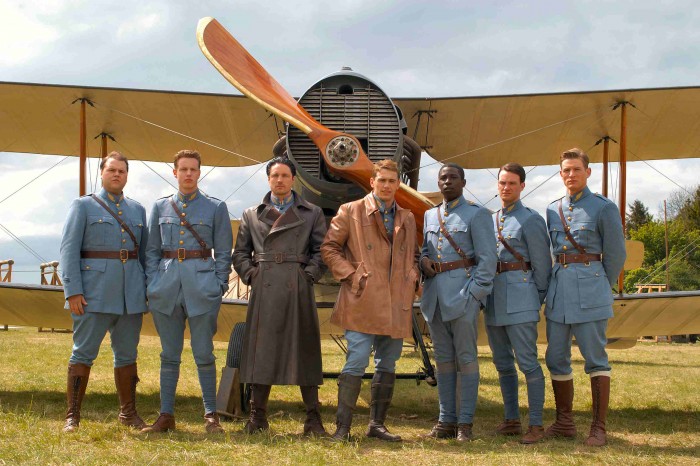 You've done some acting in the past.ELLISON: Never again [laughs]. Not in a million years.Not even in Top Gun 2?ELLISON: Never ever again, nobody could pay me enough. No, never in a million years.GOLDBERG: Speaking of acting, here's the one thing we haven't talked about from Rogue Nation, all kidding aside, and that is Rebecca Ferguson.
You've done some acting in the past.ELLISON: Never again [laughs]. Not in a million years.Not even in Top Gun 2?ELLISON: Never ever again, nobody could pay me enough. No, never in a million years.GOLDBERG: Speaking of acting, here's the one thing we haven't talked about from Rogue Nation, all kidding aside, and that is Rebecca Ferguson.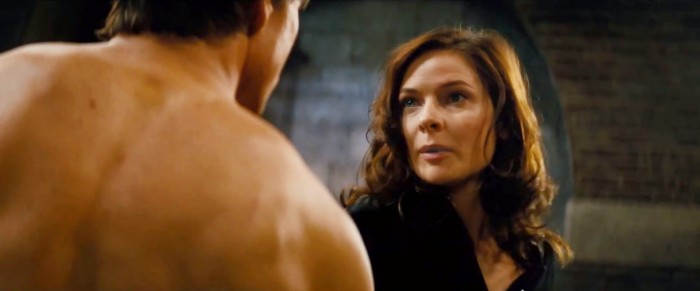 Heard great things.GOLDBERG: When you all see this movie, you are going to walk and say 'this woman's a movie star.' She's incredible in this film, I mean incredible. I think she brings something, no offense to other people who have been in prior films, but this woman has a physicality to her that is unreal. You've seen the trailer, you've seen the move with the legs around somebody's neck, it's the tip of the iceberg with what she does in this movie. I promise you will say 'you were right' when the movie's over.Like Sarah Connor in Terminator Genisys, is that a focus for you to have these strong female characters?GOLDBERG and ELLISON: Absolutely.GOLDBERG: I have a 21-month-old daughter. I want her watching a woman like this.When you are working with someone like Rebecca, you love her work, you happen to run Skydance, and you see the dailies and you know what she's doing. Does that all of a sudden mean you're thinking 'we need to get her in something else before people realize how good she is. What else is she good in?'GOLDBERG: There might be something else she's looking at right now.Is it a Skydance movie?GOLDBERG: It very well might be.ELLISON: Yes.
Heard great things.GOLDBERG: When you all see this movie, you are going to walk and say 'this woman's a movie star.' She's incredible in this film, I mean incredible. I think she brings something, no offense to other people who have been in prior films, but this woman has a physicality to her that is unreal. You've seen the trailer, you've seen the move with the legs around somebody's neck, it's the tip of the iceberg with what she does in this movie. I promise you will say 'you were right' when the movie's over.Like Sarah Connor in Terminator Genisys, is that a focus for you to have these strong female characters?GOLDBERG and ELLISON: Absolutely.GOLDBERG: I have a 21-month-old daughter. I want her watching a woman like this.When you are working with someone like Rebecca, you love her work, you happen to run Skydance, and you see the dailies and you know what she's doing. Does that all of a sudden mean you're thinking 'we need to get her in something else before people realize how good she is. What else is she good in?'GOLDBERG: There might be something else she's looking at right now.Is it a Skydance movie?GOLDBERG: It very well might be.ELLISON: Yes.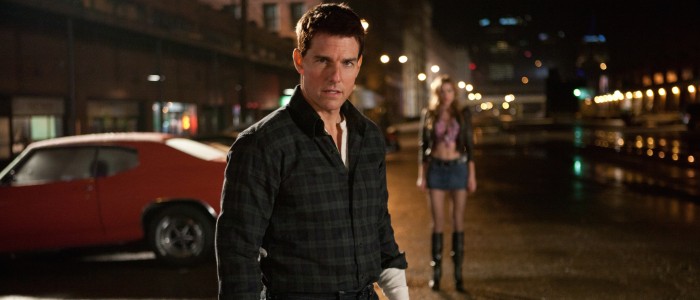 Could it be a Jack Reacher sequel?GOLDBERG: No, it's not actually.But I do wanna ask about a Jack Reacher sequel. I really, really dug Jack Reacher.GOLDBERG: Thank you, so do we.ELLISON: Thank you.That was one of those movies where a lot of us were hoping for a sequel and then we were nervous it was not gonna happen, and now we're hearing it will happen. What's the current status of a sequel? Is there a timeframe you'd like to get it in theaters?GOLDBERG: We hired Edward Zwick. Right now Ed Zwick and Marshall Herskovitz are doing a rewrite of the original draft that was written by Richard Wenk. Again, going back to where we started this interview, it all comes down to the script. Our hope, Tom's hope, Paramount's hope is that we are shooting mid-October the sequel to Jack Reacher, but we haven't read Ed and Marshall's draft yet. All of the dominoes fall once that happens because if we like that draft and Tom likes that draft, we're gonna be shooting in October.
Could it be a Jack Reacher sequel?GOLDBERG: No, it's not actually.But I do wanna ask about a Jack Reacher sequel. I really, really dug Jack Reacher.GOLDBERG: Thank you, so do we.ELLISON: Thank you.That was one of those movies where a lot of us were hoping for a sequel and then we were nervous it was not gonna happen, and now we're hearing it will happen. What's the current status of a sequel? Is there a timeframe you'd like to get it in theaters?GOLDBERG: We hired Edward Zwick. Right now Ed Zwick and Marshall Herskovitz are doing a rewrite of the original draft that was written by Richard Wenk. Again, going back to where we started this interview, it all comes down to the script. Our hope, Tom's hope, Paramount's hope is that we are shooting mid-October the sequel to Jack Reacher, but we haven't read Ed and Marshall's draft yet. All of the dominoes fall once that happens because if we like that draft and Tom likes that draft, we're gonna be shooting in October.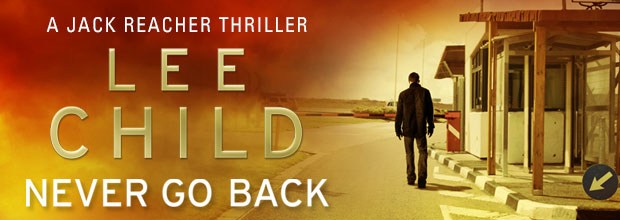 On IMDB, there is a synopsis which talks about Jack going home and he is looked at as a murder suspect. Is that the story you guys are still working on?ELLISON: This movie, which has been publicly said is obviously based on the most recent book, and so there are obviously a lot of similarities which goes forward to that. Some stuff will be expanded on top of that, but it is not stuff we can...GOLDBERG: Fair to say, the first Jack Reacher was based on One Shot and we used aspects of that book and changed aspects of that book. It's fair to say this movie is based on Never Go Back. It'll use aspects from that book. It will change aspects from that book.
On IMDB, there is a synopsis which talks about Jack going home and he is looked at as a murder suspect. Is that the story you guys are still working on?ELLISON: This movie, which has been publicly said is obviously based on the most recent book, and so there are obviously a lot of similarities which goes forward to that. Some stuff will be expanded on top of that, but it is not stuff we can...GOLDBERG: Fair to say, the first Jack Reacher was based on One Shot and we used aspects of that book and changed aspects of that book. It's fair to say this movie is based on Never Go Back. It'll use aspects from that book. It will change aspects from that book.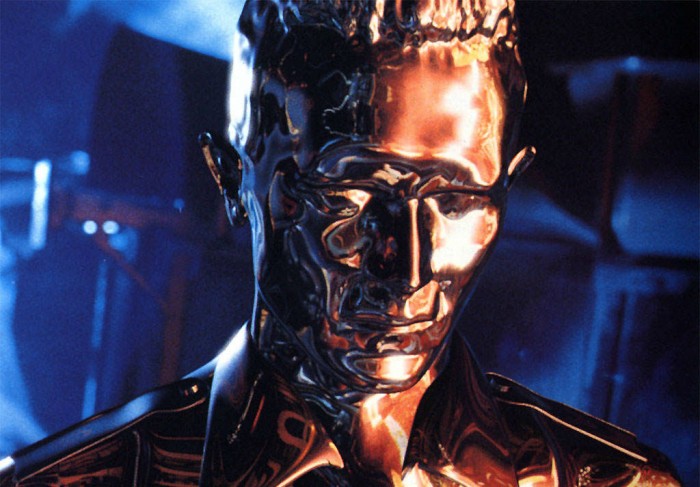 Just talking about sequels, I would like to briefly go back to Terminator.
Just talking about sequels, I would like to briefly go back to Terminator.
GOLDBERG: Please! I thought you were gonna say World War Z, I really did, but keep going.
I was wondering if we can expect any cameos from the original cast of Terminator 1 and 2, should the sequel go ahead, which it will.ELLISON: I think all to be determined at this point in time. I can't say what it is, but there is a particular part written into the second movie from somebody that you have seen in the prior film. Who it is we will have to wait to be lucky enough to make the next movie.GOLDBERG: By the way, just so you know, we talked a lot about whether or not to do that for this film. I mean it isn't something we just ignored or blew off, we actually really sensitively discussed it with Laeta and Patrick and Alan, whether or not we wanted to do that in Genisys. We ultimately decided not to because honestly we so want this movie to stand on its own two feet. Clearly we've all said it a hundred times, you've heard it in the last two days, how respectful and reverential we are of the Cameron films and how our movie obviously starts in a very similar place to T1 and then diverges and really our movie becomes its own. So we made the conscious decision to place somebody from one of the other films into this movie with an audience, let's just say a brand new audience who's never seen a Terminator film before could pull you out of the movie when half the audience is skittering and making comments about 'oh, that guy!' while you're sitting there not knowing what they're talking about, so we consciously made the decision not to do that. Should we be so lucky to get to a sequel, we might be on solid ground.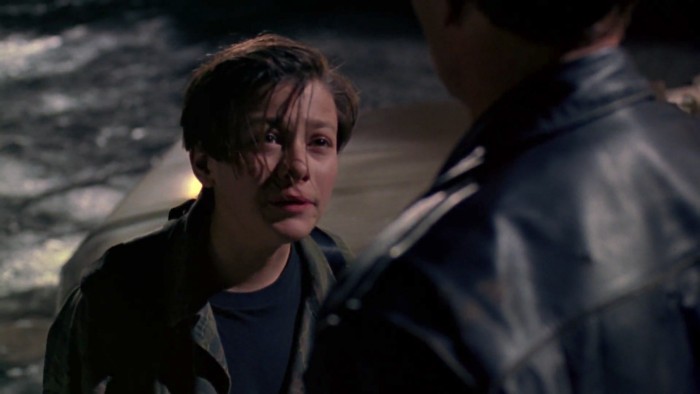 Was there any talk of bringing back Eddie [Edward] Furlong for John Connor since the franchise has changed?ELLISON: Eddie Furlong's performance in T2 is legendary and iconic. For us, we really wanted our version of John Connor to exist in the present day and I got to know Jason Clarke through my sister's movie Zero Dark Thirty and will never forget watching that movie and just being blown away by Jason's performance. From that moment in time, he was always the first choice to play John Connor because in our movie which you guys have all seen now, you have to fall in love with John Connor, the savior of humanity, in the first fifteen to twenty minutes of the movie, and that was really the tall task that was put upon Jason which was the audience needs to love you right off the bat as you're being introduced so that when it turns, it's as tragic for them as it is for Sarah and for Kyle. And Jason is that actor that has that tremendous amount of depth and we love him as our John Connor in this movie.
Was there any talk of bringing back Eddie [Edward] Furlong for John Connor since the franchise has changed?ELLISON: Eddie Furlong's performance in T2 is legendary and iconic. For us, we really wanted our version of John Connor to exist in the present day and I got to know Jason Clarke through my sister's movie Zero Dark Thirty and will never forget watching that movie and just being blown away by Jason's performance. From that moment in time, he was always the first choice to play John Connor because in our movie which you guys have all seen now, you have to fall in love with John Connor, the savior of humanity, in the first fifteen to twenty minutes of the movie, and that was really the tall task that was put upon Jason which was the audience needs to love you right off the bat as you're being introduced so that when it turns, it's as tragic for them as it is for Sarah and for Kyle. And Jason is that actor that has that tremendous amount of depth and we love him as our John Connor in this movie.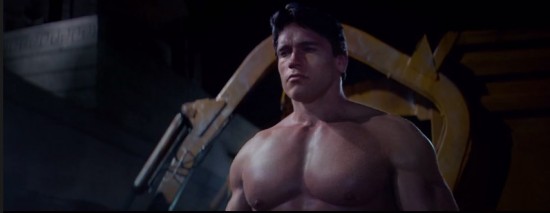 You've also got a cameo from young Arnold [Schwarzenegger]. Can you talk a bit about how that whole process all worked? I'm still trying to wrap my head around it.ELLISON: We're incredibly proud, and hats are really off to Janek Sirrs who is our visual effects supervisor and Shari Hanson who is our visual effects producer. The holy grail of visual effects has always been to create a walking living breathing synthespian. When you're making Star Trek, the Star Trek Enterprise has absolutely gotten better in its renderings as the franchise has gone on, but nobody knows what it really looks like because it doesn't exist. Arnold Schwarzenegger is one of the most photographed men on the planet [laughs] and everybody knows what he looks like in the first two Terminator movies, particularly in Terminator 1. And the human eye is very, very adept to looking at something that it sees every day and saying 'this is fake, this is not right.' The common problem was the being dead behind the eyes and that uncanny valley and you really get into that. This was the first time we said 'we're gonna go for it, we're gonna do it and we're actually gonna make it happen.' And the way that we built that scene was we built the Griffith Park set in New Orleans. Arnold played Guardian, and the Terminator, the young Arnold, was played by a bodybuilder by the name of Brett Azar. We scoured the earth and found one person that was almost as big as Arnold Schwarzenegger.GOLDBERG: Arnold likes to say 'almost'.ELLISON: He was the only person who had the fifty-inch back that Arnold had at that point in time, but if you really get into it, the biceps and the quads are smaller than Arnold was at that point in time. You shoot the sequence live-action, cut it as you would live-action, and that way Arnold has something to play against, and you can actually shoot the fight sequence, you can frame better, and you get that real human interaction when two people are pushing off of one another. Once you cut it, then it gets handed over to Janic and Shari and thousands of visual effects reviews and the team at NPC, and they built a model of young Arnold exactly as he was in the 80s which took about a year and a half to construct and then you actually hook that up to the live-action performance and then further adjust that through key frame animation to where every single movement is animated and you light it and texture it and truly go through hundreds and hundreds of revisions getting the skin tones right, the jaw line shaped appropriately, the glint in the eyes that you need as the reflected. It was the first thing that we started working on and the very first sequence that was turned over, and it was the last thing that we finished, the last two young Arnold shots were delivered at 11:30 at night when we were in color correction and we had to finish the movie at midnight or we wouldn't make our release date and we finished at 12:03am. I'll say a very special moment for me was when we got to screen the movie for Jim who has pretty much stretched the bar in every movie that he's made and what's possible for visual effects and when he looked at me and said, 'You guys did it. The young Arnold is flawless,' was pretty amazing. The credit really goes to the team at NPC and Janek Sirrs and Shari. It was wildly, wildly complicated. It was the most challenging visual effect we had on this movie and we're very proud of it.GOLDBERG: The irony is that Janic and Shari both said to us when we first started, in addition to saying 'it will be the last thing we finish, don't kid yourselves' is that 'the irony is that if we do it right, if we succeed, no one's gonna think it's a visual effect. Everybody's just going to think we grabbed the footage from the first movie and cut it in.' And we heard that a lot and we think it's hilarious that that, which is a complete visual effect people are gonna think is real, and the bus flipping on the bridge, which a completely practical real element, everybody thinks is a visual effect.
You've also got a cameo from young Arnold [Schwarzenegger]. Can you talk a bit about how that whole process all worked? I'm still trying to wrap my head around it.ELLISON: We're incredibly proud, and hats are really off to Janek Sirrs who is our visual effects supervisor and Shari Hanson who is our visual effects producer. The holy grail of visual effects has always been to create a walking living breathing synthespian. When you're making Star Trek, the Star Trek Enterprise has absolutely gotten better in its renderings as the franchise has gone on, but nobody knows what it really looks like because it doesn't exist. Arnold Schwarzenegger is one of the most photographed men on the planet [laughs] and everybody knows what he looks like in the first two Terminator movies, particularly in Terminator 1. And the human eye is very, very adept to looking at something that it sees every day and saying 'this is fake, this is not right.' The common problem was the being dead behind the eyes and that uncanny valley and you really get into that. This was the first time we said 'we're gonna go for it, we're gonna do it and we're actually gonna make it happen.' And the way that we built that scene was we built the Griffith Park set in New Orleans. Arnold played Guardian, and the Terminator, the young Arnold, was played by a bodybuilder by the name of Brett Azar. We scoured the earth and found one person that was almost as big as Arnold Schwarzenegger.GOLDBERG: Arnold likes to say 'almost'.ELLISON: He was the only person who had the fifty-inch back that Arnold had at that point in time, but if you really get into it, the biceps and the quads are smaller than Arnold was at that point in time. You shoot the sequence live-action, cut it as you would live-action, and that way Arnold has something to play against, and you can actually shoot the fight sequence, you can frame better, and you get that real human interaction when two people are pushing off of one another. Once you cut it, then it gets handed over to Janic and Shari and thousands of visual effects reviews and the team at NPC, and they built a model of young Arnold exactly as he was in the 80s which took about a year and a half to construct and then you actually hook that up to the live-action performance and then further adjust that through key frame animation to where every single movement is animated and you light it and texture it and truly go through hundreds and hundreds of revisions getting the skin tones right, the jaw line shaped appropriately, the glint in the eyes that you need as the reflected. It was the first thing that we started working on and the very first sequence that was turned over, and it was the last thing that we finished, the last two young Arnold shots were delivered at 11:30 at night when we were in color correction and we had to finish the movie at midnight or we wouldn't make our release date and we finished at 12:03am. I'll say a very special moment for me was when we got to screen the movie for Jim who has pretty much stretched the bar in every movie that he's made and what's possible for visual effects and when he looked at me and said, 'You guys did it. The young Arnold is flawless,' was pretty amazing. The credit really goes to the team at NPC and Janek Sirrs and Shari. It was wildly, wildly complicated. It was the most challenging visual effect we had on this movie and we're very proud of it.GOLDBERG: The irony is that Janic and Shari both said to us when we first started, in addition to saying 'it will be the last thing we finish, don't kid yourselves' is that 'the irony is that if we do it right, if we succeed, no one's gonna think it's a visual effect. Everybody's just going to think we grabbed the footage from the first movie and cut it in.' And we heard that a lot and we think it's hilarious that that, which is a complete visual effect people are gonna think is real, and the bus flipping on the bridge, which a completely practical real element, everybody thinks is a visual effect.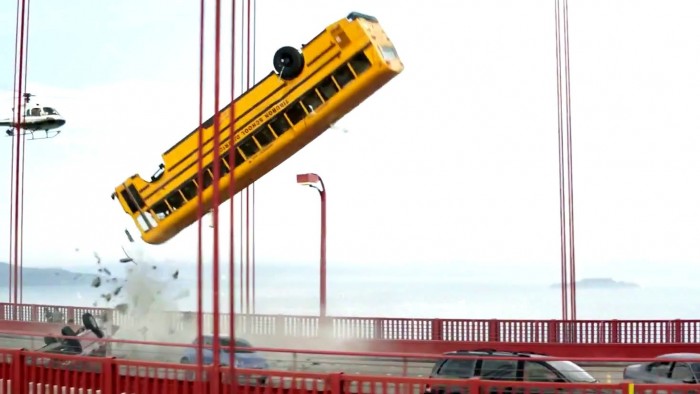 I've heard that too, which is funny. People think the bus flip is just some effect.
I've heard that too, which is funny. People think the bus flip is just some effect.
GOLDBERG: It happens twice.
ELLISON: The Terminator movies have been built on both groundbreaking visual effects and tremendous practical action, and visual effects should be used to do the things that are impossible. Arnold in the 1980s is impossible without visual effects. You can flip a bus, and so we built a five hundred foot section of the bridge in New Orleans and we flipped a bus.
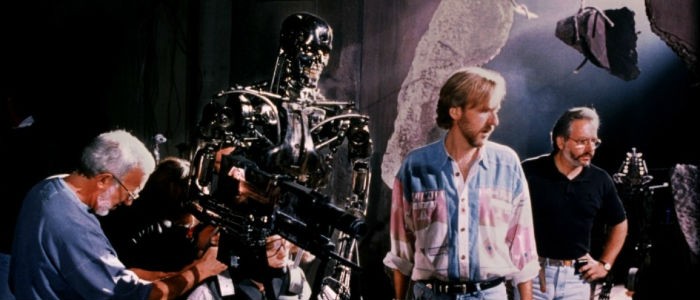 You mentioned James Cameron and I feel like our readers are very cynical, and they're like 'oh, he got paid to say that' or 'he's a producer on this film', and I know that's not the case. Can you talk a little bit about that?GOLDBERG: Can I answer bluntly and then you're gonna talk longer?ELLISON: Yeah.GOLDBERG: Seriously, if we're gonna have this conversation, what amount of money does anybody think somebody can offer James Cameron that is going to make a damn bit of difference or to get him to stand up and give an opinion that he doesn't believe in? It actually just boggles my mind, really, like what is that amount? Absolutely not, that is so not the case, the man is not making a dollar off of this movie or because of the comments he's made in support. [To Ellison] Go ahead.ELLISON: [Laughs] First, everything she said is 100% true. I mean I'm done talking about it and I've said it and it's fortunate enough to be true, James Cameron is my favorite filmmaker of all time, so when we got the rights to the franchise, I absolutely reached out to Jim out of respect and the dream was to make a movie that he felt belonged in the universe that he created because personally that's what meant everything to me, so I screened the movie for him at his house and he throughout different times would make comments watching the movie where I'd be like 'okay, I think he's actually liking the film.' And for him to come out and say publicly that he thinks the film is the true sequel to Judgment Day and that it actually deserves and belongs in the universe that he created means everything to me, and everything to everybody involved. The really special thing about making this movie, whether it was Hans Zimmer or Janek or Shari or Alan or Dana or Laeta and Patrick—Laeta wrote Avatar with him—but what most people don't know is Hans Zimmer when he was writing his very first score, literally they were recording the track for Judgment Day at the time, and the machine broke. And he was the engineer that went in and fixed the mixing stage so they could mix that movie. Everybody on this movie...GOLDBERG: Roger Barton.ELLISON: Roger Barton. His big break was getting to edit Titanic for Jim. So everybody on this film loves those first two movies and for the entire group involved to know that it's a film that he loves, and has publicly stated, means the world to absolutely all of us, because we are fans.
You mentioned James Cameron and I feel like our readers are very cynical, and they're like 'oh, he got paid to say that' or 'he's a producer on this film', and I know that's not the case. Can you talk a little bit about that?GOLDBERG: Can I answer bluntly and then you're gonna talk longer?ELLISON: Yeah.GOLDBERG: Seriously, if we're gonna have this conversation, what amount of money does anybody think somebody can offer James Cameron that is going to make a damn bit of difference or to get him to stand up and give an opinion that he doesn't believe in? It actually just boggles my mind, really, like what is that amount? Absolutely not, that is so not the case, the man is not making a dollar off of this movie or because of the comments he's made in support. [To Ellison] Go ahead.ELLISON: [Laughs] First, everything she said is 100% true. I mean I'm done talking about it and I've said it and it's fortunate enough to be true, James Cameron is my favorite filmmaker of all time, so when we got the rights to the franchise, I absolutely reached out to Jim out of respect and the dream was to make a movie that he felt belonged in the universe that he created because personally that's what meant everything to me, so I screened the movie for him at his house and he throughout different times would make comments watching the movie where I'd be like 'okay, I think he's actually liking the film.' And for him to come out and say publicly that he thinks the film is the true sequel to Judgment Day and that it actually deserves and belongs in the universe that he created means everything to me, and everything to everybody involved. The really special thing about making this movie, whether it was Hans Zimmer or Janek or Shari or Alan or Dana or Laeta and Patrick—Laeta wrote Avatar with him—but what most people don't know is Hans Zimmer when he was writing his very first score, literally they were recording the track for Judgment Day at the time, and the machine broke. And he was the engineer that went in and fixed the mixing stage so they could mix that movie. Everybody on this movie...GOLDBERG: Roger Barton.ELLISON: Roger Barton. His big break was getting to edit Titanic for Jim. So everybody on this film loves those first two movies and for the entire group involved to know that it's a film that he loves, and has publicly stated, means the world to absolutely all of us, because we are fans.
Thank you so much.GOLDBERG: And guys I'm giving you one more comment because we didn't talk about it and no further thing other than this, mark my words: Juan Antonio Bayona doing World War Z 2 is gonna be epic.
